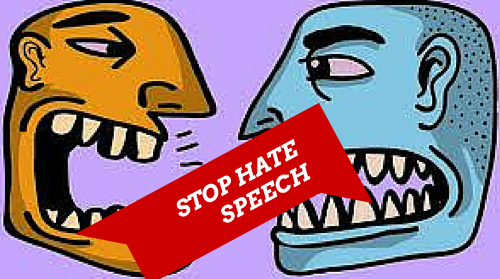25-05-2015, 00:00 Category: Media Diversity, Media monitoring for hate speech, News
 School of Peacemaking and Media Technology,
involved in media development and hate speech studies, has looked into the
debates and comments in media and on the web that appeared after some Russian
and local media outlets, online newspapers reprinted the article titled On Lions
and Jackals with the subtitle
Central State Channel in Kyrgyzstan Promotes Nazism.
School of Peacemaking and Media Technology,
involved in media development and hate speech studies, has looked into the
debates and comments in media and on the web that appeared after some Russian
and local media outlets, online newspapers reprinted the article titled On Lions
and Jackals with the subtitle
Central State Channel in Kyrgyzstan Promotes Nazism.
The article was published on 19 May 2015 both on the websiteand in Moskovsky Komsomolets-Asia newspaper. It discussed inappropriate statements of Abdrakhman Alymbaev, former chairman of the National Union of Writers of Kyrgyzstan and public figure, in a TV programme Tooluktardyn Tok Shousu (Highlanders Talk Show) broadcasted on OTRK in December 2014. The host and guest of the programme were discussing the differences between ethnic groups residing in Kyrgyzstan. The author of the article in MK-Asia accused Abdrakhmanov and OTRK of "voicing Nazi ideas”.
Also, a 4-minute video demonstrating a part of this TV programme was uploaded to YouTube on May 19, 2015.
Experts of School of Peacemaking and Media Technologyfound more than 150 short articles, posts, comments that discussed this topic in media and on the web last week. The majority of publications contained hate speech, xenophobic clichés and stereotypes, dehumanising metaphors concerning both parties. When quoting public speakers commenting on this issue, journalists conveyed hate speech, which had negative impact on both the audience and commentators that were immediately involved in the debate and used offensive language.
There is a risk that a failure to comply with journalistic standards and code of ethics when publishing similar media texts can lead to real violence, while individual social groups can become the victims of various forms of discrimination based on ethnic or other background.
The right to freedom of expression certainly provides the opportunity to debate on the issues covering a variety of approaches and opinions. Local media do exercise this right since Kyrgyzstan has best rankings in international freedom of expression index as compared to Russia and all Central Asian states.
However, journalists should seek to limit negative consequences of manipulations with ethnic issues, to protect the audience from hate speech, xenophobic clichés and stereotypes, which are often circulated and voiced by officials, including for political and election purposes.
Analysis of recent debates in media and online outlets has detected the calls for mandatory criminal proceedings against those "guilty” of producing and broadcasting the Highlanders Talk Show with no qualifying proof. Different commentators also demand that control over media, particularly, the TV channel that allowed the production of the TV programme and be tighten and media content concerning ethnic issues be censored.
School of Peacemaking and Media Technology warns against any attempt to implement these actions in practice, which is unacceptable in the democratic society. The best measure to mitigate the situation is to increase ethical and social responsibility of media, to promote tolerance, to strengthen the culture of peace, to create open discussion and freedom of speech.
Hate speech needs to be countered with speech intended to educate the audience and eliminate misconceptions and prejudice, overcome the enemy image and destroy stereotypes, thus changing public conscience voluntarily.
We recommend using internationally approved instruments to reduce hatred and xenophobic moods in the society. First, speakers and politicians should approve of ethical principles that determine the behaviour of their representatives, especially during public speeches from rostrums and in media, and make sure they are followed.
Second, journalists should be aware of the risk posed by discrimination of individuals and groups, and negative stereotypes circulated by media. Unnecessary references to ethnic group, race, and other group characteristics that could promote intolerance should be avoided.
Third, self-regulation is still the most effective way to solve issues related to the professional activity of journalists.
The media should revise voluntary professional codes of conduct, which should contain the principles of diversity and non-discrimination; take measures to announce these norms and implement them.
Moreover, media workers should constantly develop professionally, improve their skills to cover ethnic and cultural diversity, language and speech security.

The School of Peacemaking and Media Technology in Central Asia announces an annual competition among students from Kyrgyzstan, Kazakhstan,…

25 journalists and media workers from various regions of Kyrgyzstan have been trained to counter the propaganda of violent extremism and hate in…